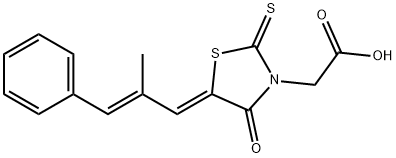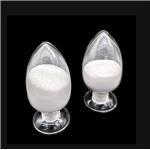Aldose reductase, the first enzyme of the polyol pathway, converts glucose to sorbitol in the presence of NADPH. Increased aldose reductase expression, induced by hyperglycemia, has been associated with complications of diabetes, as it can create a metabolic imbalance in tissues dependent on insulin for the uptake of glucose. Epalrestat is a carboxylic acid-based inhibitor of aldose reductase (IC50 = 0.01-15 μM). At 10 nM, it can suppress high glucose-induced proliferation of vascular smooth muscle cells and at 100 nM it can prevent high glucose-induced intracellular NADH/NAD+ increase and membrane-bound protein kinase C activation. Epalrestat has been shown to reduce oxidative stress in type 2 diabetic patients, significantly decreasing lipid hydroperoxide levels in erythrocytes when administered at 150 mg/day.





